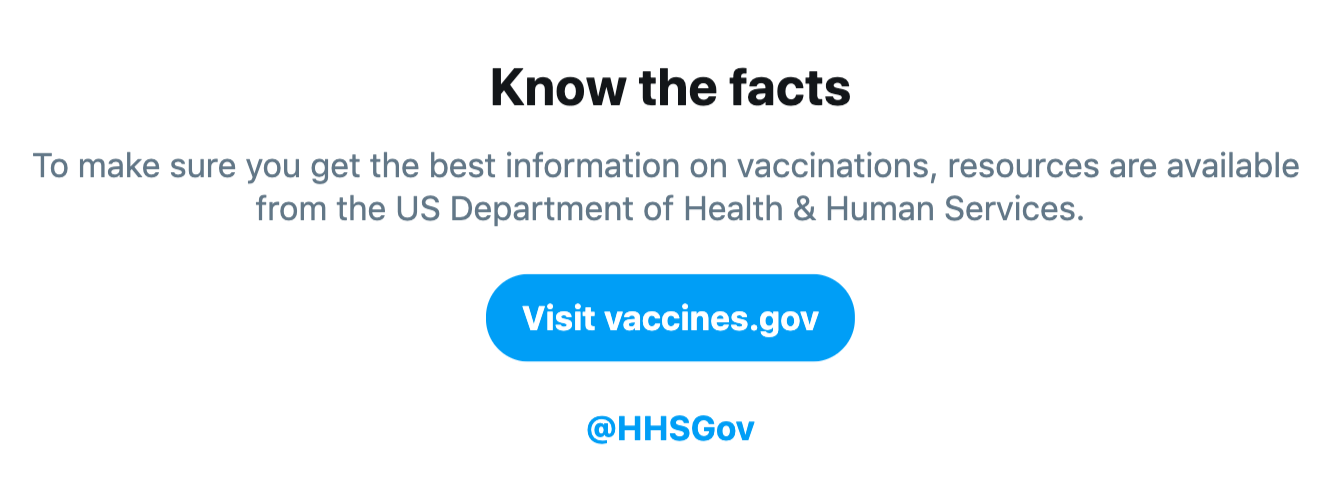Twitter’s New Vaccine Feature Won’t Stop Anti-Vaxxers
Credit to Author: Shayla Love| Date: Wed, 15 May 2019 16:13:01 +0000
Twitter announced Friday that it would be the latest social media platform to intervene in searches for information related to vaccines. Now if you search for keywords associated with vaccines, a prompt appears that directs you to vaccines.gov—a resource from the U.S. Department of Health and Human Services. Twitter said it also won’t auto-suggest search terms that “are likely to direct individuals to non-credible commentary and information about vaccines.”

The move happened in the midst of a measles outbreak and a recent whooping cough outbreak in the US—and the rise of non-medical “philosophical-belief” vaccine exemptions in 12 of the 18 states that allow for such things, per a 2018 study in PLOS Medicine. When vaccination rates go down, infection numbers tend to climb back up. Experts say Twitter’s change is a step in the right direction, but it’s unclear if it will have a real impact on curbing anti-vaccine sentiment.

The internet, of course, plays a prominent role in the spread of inaccurate information. A study from 2010 found that looking at vaccine-critical websites for just 5 to 10 minutes increased the perception of the risk of vaccines, and made the perceived risk of not getting vaccinated decrease. Even months later, exposure to anti-vax information informed opinions about vaccines, and led parents to give their children fewer vaccines than recommended.
“The problem with digital misinformation is that it spreads in a different manner than other, more traditional pathways,” said Jeanine Guidry, an assistant professor at Virginia Commonwealth University who studies the use of social media and mobile technology in health, risk, and crisis communication. “As social media users, we all have the tools to not just consume information, but also create, modify, and share it. Misinformation about vaccines is nothing new, not even on social media, but it’s harder to control because it can exist in so many places.”
Twitter’s search prompt follows similar recent actions by Pinterest, Facebook, and Youtube. As of the end of last year, if you tried to search for “vaccine” or “vaccine danger” on Pinterest, nothing would show up. “Right now, blocking results in search is a temporary solution to prevent people from encountering harmful misinformation,” Jamie Favazza, a spokeswoman for Pinterest, told the New York Times.
Youtube made changes to its algorithm so that videos with accurate information get preference when people search for vaccines. They also stopped letting anti-vaccine videos show advertisements, thereby demonetizing those videos.
On March 7, Facebook released a statement saying they too would tackle vaccine misinformation by not recommending groups or Pages that spread anti-vax info, not predicting them in the search bar, rejecting anti-vax ads, and not allowing to Pages with vaccine misinformation to fundraise on Facebook.
How effective these actions are is still to be seen, said Heidi Larson, an anthropologist and the director of The Vaccine Confidence Project, a research group at the London School of Hygiene & Tropical Medicine. She wrote in a 2018 essay in Nature that “the deluge of conflicting information, misinformation and manipulated information on social media should be recognized as a global public-health threat.”
She pointed out that while the Twitter prompt does come up if you search “vaccine” or “vaccine danger,” it’s still relatively easy to find anti-vaccine information by tweaking your word choice. Searching for “vaccine ingredients,” for example, pulls up web pages leading to misinformation about the danger of what vaccines contain.
Meanwhile, despite its implemented changes, Facebook continued to show recommended content associating vaccines and autism, CNN reported, and Instagram searches for vaccines still turn up pages promoting vaccine hesitancy.
“The bigger threat is the ideas and sentiments that are being shared,” Larson said. “Social media interventions can mitigate their spread, but it will not stop them from circulating. My guess is [people] will open [the prompted web page] because it is there, but if they do not get the answers they are looking for, they will go elsewhere.”
Still, Larson said it’s important to explore these alternatives, and she hopes they don’t backfire if people find them too controlling.
“Do social media platforms have a responsibility to try to address this? I think they do, yes—and I applaud the platforms that are trying to do so,” Guidry added. “The harder question is: how should they address it? Restricting information availability can have consequences down the road that we may not be addressing right now.”
Why Twitter chose a government site as the destination remains unclear; in response to questions from VICE a rep sent a statement that referred to HHS as a “trusted partner.” While the department is in favor of expanded vaccination programs, the Trump administration’s checkered history on the subject raises the question of whether pointing to a Trump-administration-controlled resource might not be in users’ best interest. Trump, after all, stalled on calling for action around the measles outbreak, and has questioned the validity of vaccines in the past, linking them, erroneously, to autism. The head of HHS, Alex Azar, applauded Trump when he eventually called for a strong public health response to the measles outbreak.
This article originally appeared on VICE US.